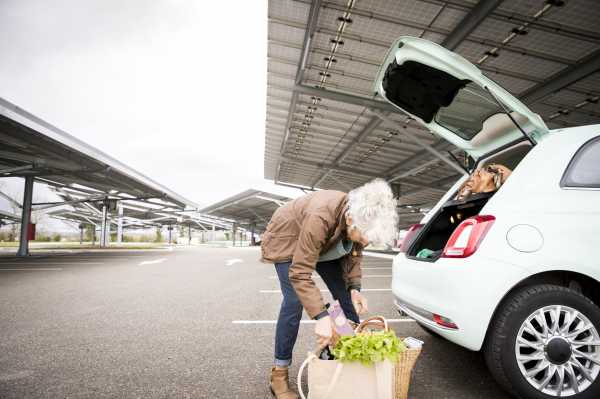

Major companies like Ford, Toyota, Google, and Apple are all investing in autonomous vehicles, and a new report from the audit, tax, and advisory firm KPMG predicts another function for them in addition to chauffeuring people: delivering groceries.
According to the report, e-commerce in the US has doubled in the past 10 years and is expected to double again in the next five. And while today, online grocery store sales only make up 2 to 4.3 percent of the market, the Food Marketing Institute predicts that online grocery sales will reach $100 billion by 2022, or about 20 percent of the grocery retail market.
The KPMG report posits that autonomous vehicles (AVs) will spur this growth by allowing for faster, cheaper delivery than services like Fresh Direct and Yummy.com can offer, as self-driving cars would eliminate the need for grocery stores to pay or protect drivers. As the report authors put it, “For an additional 40 cents, who wouldn’t want their stuff to arrive in an hour?”
Using self-driving cars to transport goods rather than people might also get around a big issue with AVs: Americans are scared of them. An Axios poll found that 64 percent of Americans are scared to be the passenger in an AV. (Though the same poll found a third of people would at least consider buying one.)
According to a 2017 study, the fear stems from a number of factors. For one, humans are overconfident in their driving ability, and although our reflexes are not as quick as a computer’s, we still have the desire to be in control. Though road traffic is the fifth leading cause of death in the world, a computer, not human error, causing the fatality seems somehow worse. Add to that the fact that the average person does not understand the algorithms programmed into AVs, and that makes it harder to trust them.
But perhaps the thought of an endless array of products delivered to your doorstep in a matter of hours for “nearly free,” as the report put it, might be enough to get people over this cognitive dissonance. And companies are already taking steps to make AV grocery delivery a reality. Recently, Kroger partnered with the tech startup Nuro to pilot a self-driving car delivery service. Amazon, Pizza Hut, and Toyota are also working on a way to disperse pies via AVs. And Ford has teamed up with Walmart and Postmates to deploy a fleet of grocery-delivering cars.
Robbie Baxter, author of The Membership Economy, says people are more okay with self-driving delivery cars because there is no immediate risk to them. “If the vehicle delivering my stuff crashes, it won’t affect me at all,” she says. “In fact, the vendor will probably send another vehicle with my goods, and I might get a discount for the delay.”
According to McKinsey & Company, 80 percent of all packages will be delivered autonomously in the next 10 years. So while people may not be quite ready to hop in an AV themselves, if one can deliver some paper towels to your doorstep, the thinking seems to be, why not?
Sourse: vox.com






